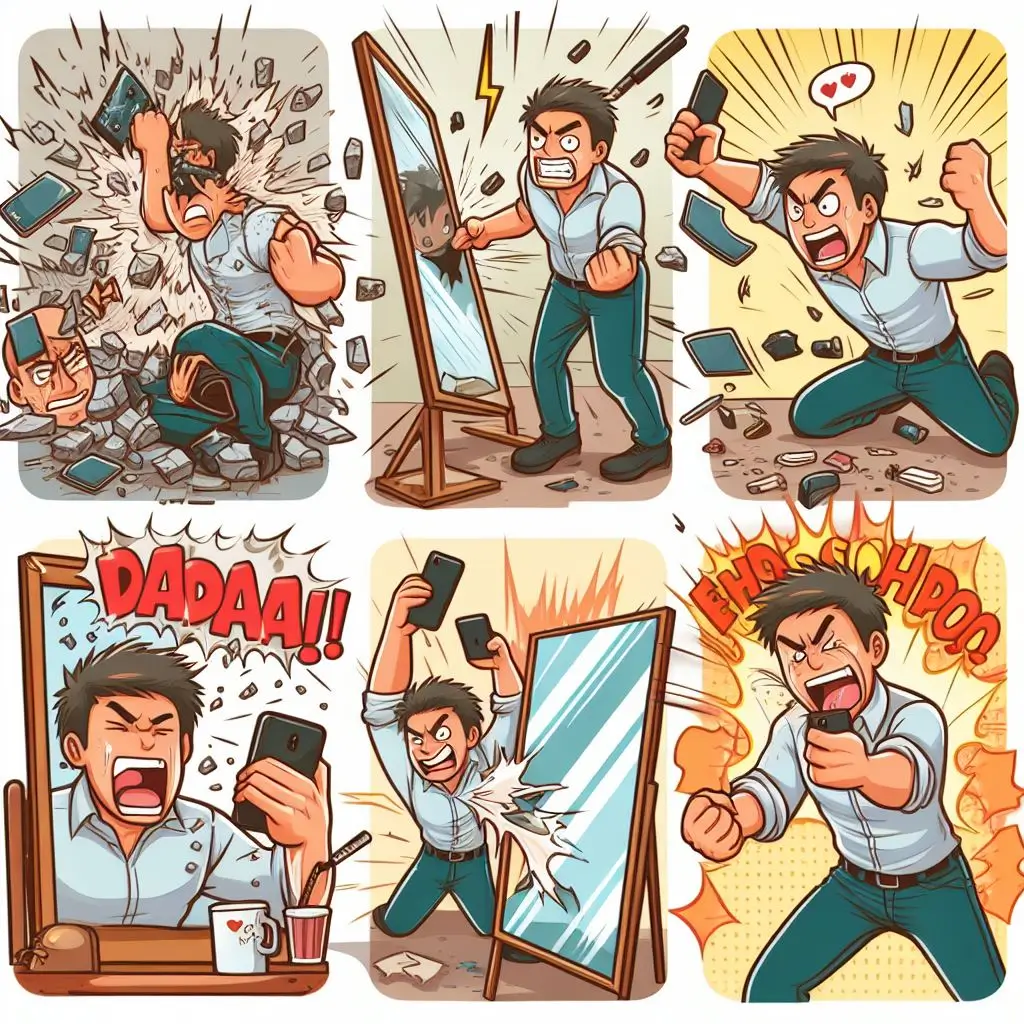Have you ever felt like walking on eggshells near someone? They explode with anger over small things. You share a different view and get yelled at. Welcome to narcissistic rage, an emotional rollercoaster that damages relationships and well-being.
In this blog, we explore the complex world of narcissistic rage. We uncover what causes these intense outbursts and share real-life examples many can relate to. Our aim is to help you respond effectively when facing such emotional storms, providing insights for stable relationships.
Get ready to understand the complexities of narcissistic behavior. We’ll explain signs, causes, and impacts of narcissistic rage. This knowledge can guide you toward healthier connections and emotional resilience. Learn to recognize red flags, set boundaries, and reclaim your emotional agency when dealing with narcissistic dynamics.
Narcissistic rage is a reaction to narcissistic injury, which is a perceived threat to a narcissist’s self-esteem or worth.
What is the Narcissistic Rage?
Narcissistic rage happens when someone feels rejected, criticized or defeated. It’s strong feelings of anger, embarrassment and entitlement.
It can start from small things like someone looking at you wrong or disagreeing with your views. When narcissistic rage hits, someone may act aggressively or violently. In some cases, it leads to harmful behaviors like substance abuse.
Narcissistic rage isn’t a mental disorder itself. But it’s a symptom of some personality disorders like narcissistic personality disorder. Anyone can have narcissistic rage. However, it’s more common in people who lack empathy, feel very entitled and have an inflated ego.
Signs of narcissistic rage
Explosive outbursts, verbal attacks, threats, and destructive actions are common signs of narcissistic rage. Here are some key indicators:
1. Explosive anger
One moment they’re calm, the next they erupt. Yelling, screaming, throwing objects, even violence – narcissistic rage often explodes without warning. If you’re with a narcissist, learn to recognize these explosive anger signs and respond safely.
Narcissistic rage is unpredictable, so stay alert to protect yourself.
2. Verbally abusive behavior
Yelling, name-calling, blaming, and derogatory comments signal narcissistic rage’s verbal abuse. It’s a power play, putting others down to regain control. Disproportionate to the situation, this verbal lashing comes in dangerous, unpredictable outbursts.
Don’t underestimate the harm these verbal attacks can inflict.
3. Threatening or violent behavior
During narcissistic rage episodes, threats and violence may follow. This terrifying behavior leaves victims feeling helpless, scared. It’s crucial to understand – this isn’t normal conduct. It signals deep, unresolved pain driving the outburst.
If faced with threats or violence, prioritize your safety first.
4. Destructive behavior, such as drinking or drug abuse
Narcissistic rage sometimes manifests in self-destructive behaviors like drinking or drug abuse. Highly damaging to the person and those around them, this conduct requires professional intervention to overcome. Don’t ignore these signs – they indicate serious underlying issues.
5. Turning the rage on oneself, such as through self-harming behaviors
Narcissistic rage prompts self-destructive acts like cutting, burning, or hitting oneself. These actions attempt to manage intense emotions linked to narcissistic rage.
6. Narcissistic rage eyes
During narcissistic rage, eyes may reveal an intense, frightening look aimed at intimidating others. If observed, it’s best to distance yourself from the situation.
Causes and Triggers of Narcissistic Rage

5 triggers of narcissistic rage are the following:
1. When you disregard their wishes
Narcissists often feel entitled and expect control over those around them. Not complying with their demands is a common trigger for narcissistic rage.
2. When criticized, even slightly
Narcissists struggle to handle any negativity or criticism. When someone critiques them, it can prompt narcissistic rage as they try to regain power.
3. When they feel rejected or ignored
Narcissists crave constant attention and validation from others. Feeling rejected can cause narcissistic rage as they seek that needed admiration.
4. When challenged or confronted
Narcissists have an inflated self-worth and view themselves as superior. Challenges or confrontations can trigger narcissistic rage to maintain their perceived status.
5. When losing control, even slightly
Narcissists demand complete control at all times. Even minor incidents like someone changing the TV channel can trigger narcissistic rage over this loss of control.
Understanding these triggers is crucial to avoid them if possible. However, it’s also vital to know how to respond effectively if narcissistic rage does occur.
How Narcissistic Abuse Damages Relationship Stability
Surviving narcissistic abuse leaves deep scars. Its effects ripple through future connections, destabilizing relationships. Understanding this fallout aids healing, fostering healthier bonds. Here are common challenges survivors face:
1. Trust Vanishes
One significant impact is trust erosion. Constant manipulation, gaslighting, emotional exploitation – these insidious tactics poison trust. Survivors question partners’ motives and sincerity, dreading mistreatment’s repeat.
2. Anxious or Distant Bonds
Narcissistic abuse breeds insecure attachment styles. Survivors become anxiously clingy or avoidantly distant. Unpredictable partner behavior warps attachment needs. Secure bonding eludes survivors, sowing relationship instability.
3. Self-Destructive Patterns
Emotional trauma ignites self-destructive habits. Risky behaviors, self-sabotage, unhealthy coping (like substance abuse) manifest. Control obsessions emerge. These toxic patterns further strain relationships, stifling personal growth.
4. Difficulty Establishing Boundaries
Survivors of narcissistic abuse often struggle with setting and enforcing boundaries in their relationships. The abusive dynamics experienced have conditioned them to tolerate unacceptable behavior and prioritize the needs of others over their own.
Consequently, they may find it challenging to assert themselves and establish healthy boundaries, which can lead to further relationship instability.
“Recovering from narcissistic abuse is a journey of self-discovery and healing, where survivors learn to reclaim their worth and rebuild their lives.”
Fahim Chughtai
Examples of Narcissistic Rage

Here are some examples of Narcissistic Rage:
1. Relationship Insults
In romantic relationships, narcissists might explode when their partners give criticism. A small comment about behavior or improvement suggestion leads to rage. They’ll insult, belittle opinions, blame perceived flaws on partners. Humiliation triggers their outbursts.
2. Workspace Criticism
Narcissists struggle with constructive feedback at work too. A coworker’s well-meant critique ignites aggression. Defensiveness, insults about competence, undermining reputations follow. Handling criticism proves challenging.
3. Parental Control
Narcissistic parents often rage when kids assert independence. A child’s divergent views or decisions defying desires prompt anger, punishment. Emotional manipulation, gaslighting, physical aggression may occur. Accepting autonomy is difficult.
4. Public Challenge
Public events carry risk if narcissists’ expertise faces questioning. Their inability to tolerate dents in public image leads to explosive outbursts. Insults, ridicule, public shaming target challengers. Regaining control motivates reactions.
These examples highlight extreme narcissists’ reactions when ego threats or image shakes occur. Outbursts damage relationships, cause trauma, harm. Inability to handle criticism proves problematic.
It’s vital to spot and comprehend narcissistic rage incidents. This helps people safeguard themselves by forming healthy relationship boundaries.
How to Respond to Narcissistic Rage?

There are some things you can do when dealing with Narcissistic Rage:
1. Remain composed and don’t get defensive
The key is to stay calm. It’s crucial not to react in anger or frustration. That will only make the narcissist feel justified in their rage and become more abusive. Take a deep breath. Stay collected, even if it seems impossible.
2. Don’t argue or try to reason
Once you’ve calmed down, don’t engage further. No arguing. No trying to make them see your perspective. Engaging will only fuel their narcissistic rage, making things worse. It’s best to walk away or remove yourself.
3. React in a way that doesn’t escalate
If not handled properly, narcissistic rage can lead to more emotional and physical abuse. Don’t react in a way that will escalate the situation, like being verbally or physically abusive yourself, or giving in to their demands. By staying calm, composed, and walking away if needed, you can diffuse the situation and protect yourself.
4. Remove yourself from the situation if possible
When you can, escape the circumstances. It’s the ideal solution, though you may be unable to in some instances. If removal is an option, take it.
Should you remain, try to stay neutral and calm. Don’t escalate things by reacting dramatically.
5. Seek Outside Help If Necessary
Seek help if the rage seems severe or frequent. Therapy, medication or both could assist.
A professional can teach healthy ways to cope with narcissistic rage. They’ll support any other mental health issues too. You needn’t face rage alone.
How long does Narcissistic Rage last?
Narcissistic rage varies in duration. It could be brief, lasting mere minutes. Or it may persist for hours, even days. Note: rage’s impact lingers despite timeframe. If severe or frequent, seek help promptly. Long-term effects demand intervention.
Craziest things Narcissists do in a Narcissistic Rage
When narcissists experience a self-involved episode, they can display some extremely outlandish behavior.
- They might purposefully throw or smash objects, with force.
- Verbal aggression towards others is commonplace, with yelling or insults.
- Personal belongings or property may be damaged, even intentionally harmed.
- Stern formal warnings communicate potential severe
Coping With Narcissistic Rage as a Narcissist
As a narcissist, acknowledging and managing your own narcissistic rage is crucial for maintaining healthier relationships and personal growth. While it may be challenging, there are strategies and resources available to help you cope with this intense emotional response. Here are some effective approaches to managing your own narcissistic rage:
1. Self-reflection and Self-Awareness
Taking the time to reflect on your emotions and behavior can provide valuable insights into the underlying causes of your narcissistic rage. Increase your self-awareness by seeking therapy or counseling. A trained professional can help you explore your feelings, triggers, and patterns of behavior, allowing you to better understand and manage your emotions.
2. Anger Management Techniques
Learning healthy anger management techniques can help you regulate your emotions during moments of narcissistic rage. Consider practicing deep breathing exercises, mindfulness meditation, or engaging in physical activities like exercise or hobbies to channel and release your anger in a constructive manner.
3. Develop Empathy and Perspective-Taking
Narcissistic rage often stems from a lack of empathy and an exaggerated sense of entitlement. Work on developing empathy by practicing perspective-taking. Consider the impact of your actions on others and try to understand their feelings and experiences. Building empathy can help you to respond to triggers with more compassion and understanding.
4. Utilize outside aid and specialized guidance
Acknowledge gaining assistance from individuals you trust or seasoned experts in narcissistic personality disorder. Therapy equips you with tools essential for emotional navigation, strengthening self-control, and developing coping strategies.
5. Engage in self-nurturing practices
Prioritizing your holistic well-being is vital for managing narcissistic rage episodes. Partake in activities bringing joy and tranquility. Ensure adequate rest and sleep while adhering to self-care routines. Caring for your emotional and physical states can diminish the intensity of narcissistic rage.
Remember, conquering narcissistic rage demands patience and commitment. Through active introspection, empathy cultivation, and self-regulation, you can progressively reduce both frequency and severity, fostering healthier bonds and personal growth. Seeking professional assistance and surrounding yourself with supportive networks greatly aids this transformative journey.
What triggers Narcissistic rage?
How Does Narcissistic rage Differ from Regular Anger?
Can Narcissistic rage Be Controlled?
Is Narcissistic rage Abuse?
Last words
If you suspect you’re facing narcissistic rage, get away quickly. Leave the situation and go somewhere safe immediately. Once you’re in a secure place, take time to relax and process your thoughts. You may also want professional support for trauma or aftermath. Finally, share with others who understand; discussing it can provide comfort.
Have you endured narcissistic rage? How did it impact you? Tell your story below.
